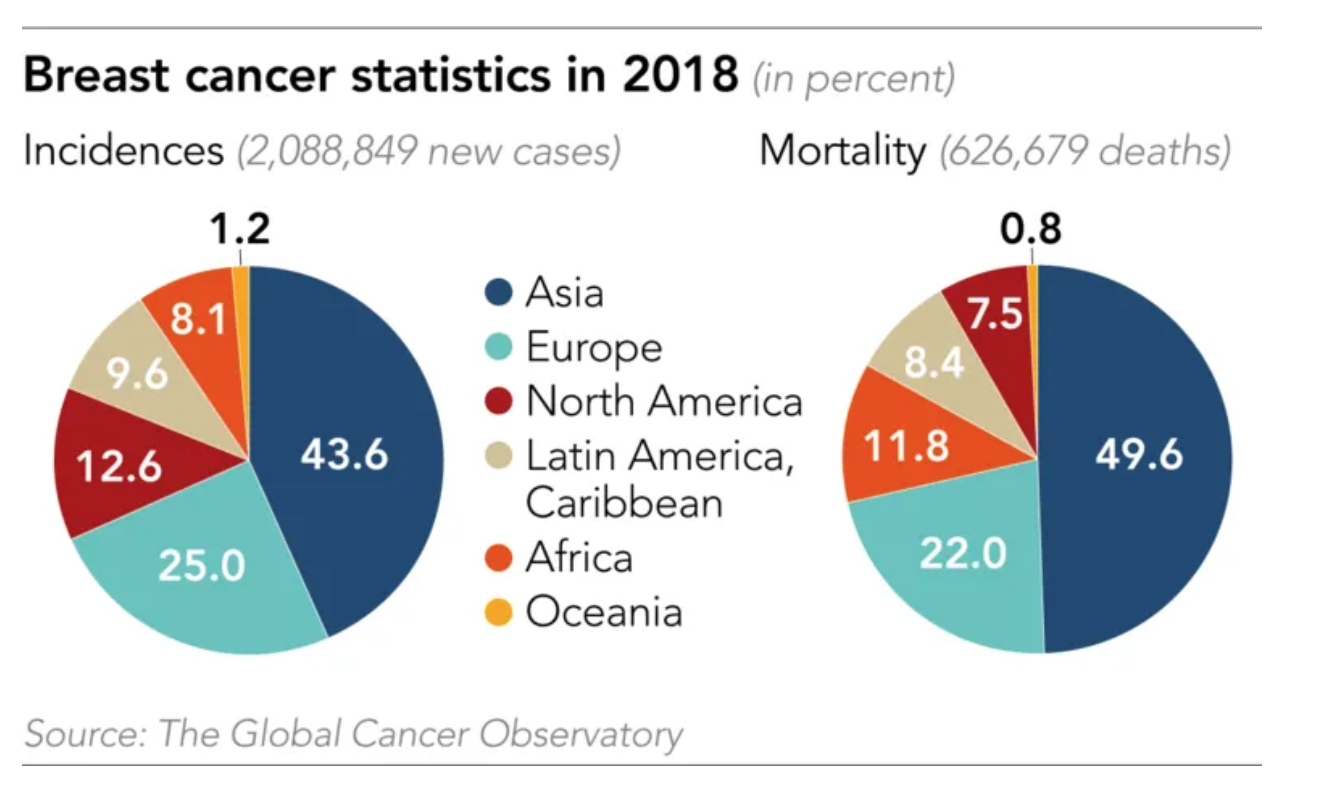Indian health care startup Niramai Health Analytix is in talks with Asian hospitals for its noninvasive, artificial intelligence-enabled technology to screen for early signs of breast cancer.
The startup has raised about USD 7 million from Japan’s Dream Incubator and local investors Pi Ventures, Axilor and Flipkart co-founder Binny Bansal, among others. It is now preparing pretrials in South and Southeast Asian countries with a high incidence of breast cancer.
According to the World Health Organization, Asia accounted for 43.6% of the 2.09 million breast cancer cases globally in 2018. The organization also noted that breast cancer is the most common cancer in women, both in developed and less developed nations.
Over 600,000 people lose their lives to breast cancer each year. Although early detection is critical to saving lives, 90% of breast cancer screenings are still performed by hand — a situation begging for a high-tech solution.
“There is a lot of incoming interest,” said Niramai founder and CEO Geeta Manjunath in an interview with the Nikkei Asian Review. “Breast cancer screening is an annual USD 14 billion opportunity… Our goal is to create a technology that is truly India’s gift to the world.”

The company name is an acronym for noninvasive risk assessment with machine intelligence, and also means “disease-free” in Sanskrit.
Founded in 2016, Niramai claims its technology can detect tumors smaller than 4 mm — one-fifth the size of what a clinical exam can find — at about half or a third the cost of conventional mammography. The company says it has screened 30,000 women and that its method is 27% more accurate than mammography.
At the heart of Niramai’s technology is a high-resolution thermal imaging device and artificial intelligence for analyzing thermal images. The technology identifies abnormal cell growth and can detect malignancies within 15 minutes.
Six medical publications have carried articles on Niramai’s technology, according to the startup. At an international meeting of the prestigious American Society of Clinical Oncology in October, Niramai was given an opportunity to introduce its technology.
The startup is conducting breast cancer screenings in rural and semi-urban communities in cooperation with local governments and nongovernmental organizations.
Shanthi, a 58-year-old mother of two from the south Indian state of Tamil Nadu, survived breast cancer thanks to early detection at one of the screenings. She had learned from her neighbors about Niramai’s free screening held in a nearby hospital.
The thermal device recorded images from five different angles and flagged a growth in Shanthi’s left breast. Quick ultrasonography showed her case was “more in favor of malignancy.” The doctor then conducted a biopsy and found a moderate lymphoid.
Another woman, 31-year-old Jyoti Gaikwad, also attended one of the screenings after dealing with discomfort in her left breast for over a year. The screening was a good opportunity to get tested, saving her a 125-km trip to the city of Pune for a sonograph or mammograph. “I’ve had the lump tested before but [Niramai’s] testing is better because it maintains the patient’s privacy and there’s no physical contact,” Gaikwad said.
The company also provides breast cancer screenings for hospitals and diagnostic centers. Screenings are available at over 50 locations across 12 Indian cities. “We’ll cover all [29] states by the end of the year,” said Manjunath, who hopes to conduct 120,000 to 150,000 screenings this year.
Niramai’s primary revenue comes from hospitals and diagnostic centers, followed by corporate screenings.
Still, the startup has yet to turn a profit. According to filings with the Ministry of Corporate Affairs, Niramai recorded revenue of INR 18.3 million (USD 250,000) in fiscal 2019 ended March, against INR 3.9 million a year earlier. Net loss, though, grew to INR 13.6 million from INR 10.7 million the previous year.
Pi Ventures’ founding partner Manish Singhal is not worried by the financials. “Revenue is not the benchmark. We look at the number of scans, what is the status of clinical trials, and so forth,” he said. “It takes time to establish proper adoption. We have a long horizon on the company, seven to eight years or more.”
Other startups are also eyeing the global market for breast cancer screenings.
India-based UE LifeSciences is marketing its portable BreastExam device, which monitors changes between healthy tissue and stiff lumps. The startup claims it has already examined over 300,000 women in 12 countries, far more than Niramai.
But Manish is betting on Niramai, owing to what he thinks is its advantage through use of thermal imaging and AI. “No other company right now does that,” he said. Other screening technologies that rely on detecting lumps can return false positives on benign lumps, he added.
Manjunath’s interest in the startup goes beyond business: Two of her cousins are breast cancers survivors. What disturbed her, though, is that neither detected the disease until it was fairly advanced. This started Manjunath, then in charge of data analytics research at Xerox India, to began thinking of ways to use data analytics to tackle breast cancer, leading to the founding of Niramai.
The startup is now at the stage where it must continue to demonstrate the effectiveness of its technology while increasing market presence and share.
This article first appeared on Nikkei Asian Review. It’s republished here as part of 36Kr’s ongoing partnership with Nikkei. 36Kr is KrASIA’s parent company.
